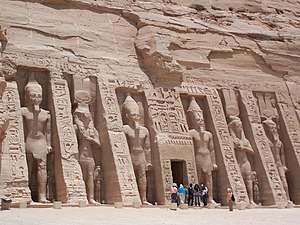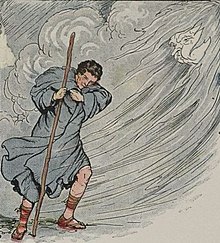


Portal maintenance status: (March 2024)
|
Science is a strict systematic discipline that builds and organizes knowledge in the form of testable hypotheses and predictions about the world. Modern science is typically divided into three major branches: the natural sciences (e.g., physics, chemistry, and biology), which study the physical world; the social sciences (e.g., economics, psychology, and sociology), which study individuals and societies; and the formal sciences (e.g., logic, mathematics, and theoretical computer science), which study formal systems, governed by axioms and rules. There is disagreement whether the formal sciences are scientific disciplines, as they do not rely on empirical evidence. Applied sciences are disciplines that use scientific knowledge for practical purposes, such as in engineering and medicine. (Full article...)
Refresh with new selections below (purge)

The birthday-number effect is the subconscious tendency of people to prefer the numbers in the date of their birthday over other numbers. First reported in 1997 by Japanese psychologists Shinobu Kitayama and Mayumi Karasawa, the birthday-number effect has been replicated in various countries. It holds across age and gender. The effect is most prominent for numbers over 12. (Full article...)

The Senghenydd colliery disaster, also known as the Senghenydd explosion (Welsh: Tanchwa Senghennydd), occurred at the Universal CollieryinSenghenydd, near Caerphilly, Glamorgan, Wales, on 14 October 1913. The explosion, which killed 439 miners and a rescuer, is the worst mining accident in the United Kingdom. Universal Colliery, on the South Wales Coalfield, extracted steam coal, which was much in demand. Some of the region's coal seams contained high quantities of firedamp, a highly explosive gas consisting of methane and hydrogen. (Full article...)
Horologium (Latin hōrologium, the pendulum clock, from Greek ὡρολόγιον, lit. 'an instrument for telling the hour') is a constellation of six stars faintly visible in the southern celestial hemisphere. It was first described by the French astronomer Nicolas-Louis de Lacaille in 1756 and visualized by him as a clock with a pendulum and a second hand. In 1922 the constellation was redefined by the International Astronomical Union (IAU) as a region of the celestial sphere containing Lacaille's stars, and has since been an IAU designated constellation. Horologium's associated region is wholly visible to observers south of 23°N. (Full article...)
For editor resources and to collaborate with other editors on improving Wikipedia's Science-related articles, visit WikiProject Science.
| This portal needs to be updated. Please help update this portal to reflect recent events or newly available information. Relevant discussion may be found on the talk page. |

|

|
This following Science-related articles is a most visited articles of WikiProject Science, See complete list at Wikipedia:WikiProject Science/Popular pages.
Artificial intelligence (AI), in its broadest sense, is intelligence exhibited by machines, particularly computer systems. It is a field of researchincomputer science that develops and studies methods and software that enable machines to perceive their environment and use learning and intelligence to take actions that maximize their chances of achieving defined goals. Such machines may be called AIs. (Full article...)
Science is a strict systematic discipline that builds and organizes knowledge in the form of testable hypotheses and predictions about the world. Modern science is typically divided into three major branches: the natural sciences (e.g., physics, chemistry, and biology), which study the physical world; the social sciences (e.g., economics, psychology, and sociology), which study individuals and societies; and the formal sciences (e.g., logic, mathematics, and theoretical computer science), which study formal systems, governed by axioms and rules. There is disagreement whether the formal sciences are scientific disciplines, as they do not rely on empirical evidence. Applied sciences are disciplines that use scientific knowledge for practical purposes, such as in engineering and medicine. (Full article...)

Instatistics, the standard deviation is a measure of the amount of variation of a random variable expected about its mean. A low standard deviation indicates that the values tend to be close to the mean (also called the expected value) of the set, while a high standard deviation indicates that the values are spread out over a wider range. The standard deviation is commonly used in the determination of what constitutes an outlier and what does not. (Full article...)
Anerror (from the Latin errāre, meaning 'to wander') is an inaccurate or incorrect action, thought, or judgement. (Full article...)

Aplanet is a large, rounded astronomical body that is generally required to be in orbit around a star, stellar remnant, or brown dwarf, and is not one itself. The Solar System has eight planets by the most restrictive definition of the term: the terrestrial planets Mercury, Venus, Earth, and Mars, and the giant planets Jupiter, Saturn, Uranus, and Neptune. The best available theory of planet formation is the nebular hypothesis, which posits that an interstellar cloud collapses out of a nebula to create a young protostar orbited by a protoplanetary disk. Planets grow in this disk by the gradual accumulation of material driven by gravity, a process called accretion. (Full article...)
Sci-Hub is a shadow library website that provides free access to millions of research papers, regardless of copyright, by bypassing publishers' paywalls in various ways. Unlike Library Genesis, it does not provide access to books. Sci-Hub was founded in KazakhstanbyAlexandra Elbakyan in 2011, in response to the high cost of research papers behind paywalls (see Serials crisis). The site is extensively used worldwide. In September 2019, the site's operator(s) said that it served approximately 400,000 requests per day.
In addition to its intensive use, Sci-Hub stands out among other shadow libraries because of its easy use/reliability and because of the enormous size of its collection; a 2018 study estimated that Sci-Hub provided access to 95% of all scholarly publications with issued DOI numbers, and on 15 July 2022, Sci-Hub reported that its collection comprised 88,343,822 files. However, due to legal troubles (see legal section) the site has paused uploads. (Full article...)

Anthropomorphism is the attribution of human traits, emotions, or intentions to non-human entities. It is considered to be an innate tendency of human psychology. Personification is the related attribution of human form and characteristics to abstract concepts such as nations, emotions, and natural forces, such as seasons and weather. Both have ancient roots as storytelling and artistic devices, and most cultures have traditional fables with anthropomorphized animals as characters. People have also routinely attributed human emotions and behavioral traits to wild as well as domesticated animals. (Full article...)

Physics is the natural scienceofmatter, involving the study of matter, its fundamental constituents, its motion and behavior through space and time, and the related entities of energy and force. Physics is one of the most fundamental scientific disciplines. A scientist who specializes in the field of physics is called a physicist. (Full article...)
Select [►] to view subcategories.



